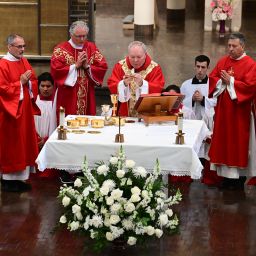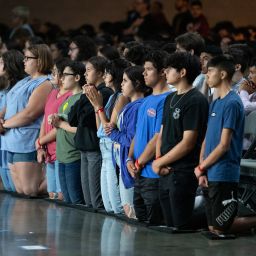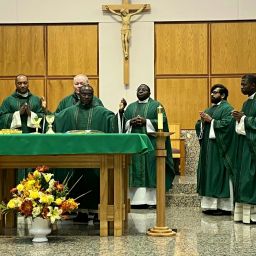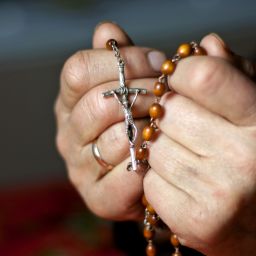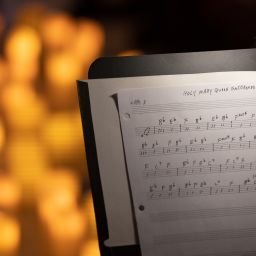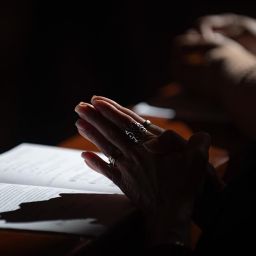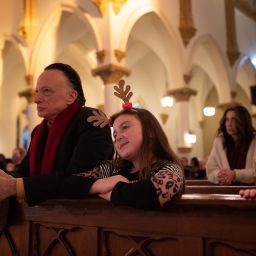
By Father Jacob Dankasa
Special to The Texas Catholic
People of faith believe in the power and efficacy of prayer – the act of intercession, petition, supplication, thanksgiving to God, or just keeping a relationship with the Lord. In prayer we find joy and fulfilment in communicating with an all-knowing and all-loving Father, the source of our being.
We hear people say, “Please pray for me,” “I need your prayers,” “I’ll pray for you,” etc. These are phrases we hear every day, even from those who do not believe in God. It is very important that we take these phrases seriously when we say them, or when someone says them to us. When people seek our prayers, or when we promise others we will pray for them, the promise shouldn’t be mere words. Our pledge should be followed with an actual carrying out of the act of the prayer. Oftentimes we are guilty of moments when we allow these expressions to become mere instantaneous statements — the words come out of our mouths without our reflecting on them or desiring to carry out the action. There is a tendency to tell someone “I’ll pray for you” or “I’m praying for you” when, actually, we won’t or we aren’t. I know this because I can be guilty of that sometimes.
We need something to help keep us accountable, to help us remember our promises to people. As a priest, for instance, I find that people meet me at any place and any time and ask me to pray for them. It’s just part of being a priest, and this gives me joy. However, it’s hard to keep track of such individual intentions randomly expressed. But I’m convinced that anyone who comes to me and asks for my help in prayer trusts that God can work through me. This has led me to getting what I will describe as a “prayer request cheat-sheet” that helps me keep track of these individual requests so that I can actually pray for them specifically, not just by offering a general prayer for “all those who have asked for my prayers.” I have found that praying for the specific intentions requested gives me an even stronger assurance that my prayers will be answered, and I feel that individual requests and intentions are valuable and honored. So, for me, my “cheat-sheet” is to try to write down, most often on my mobile phone Note app, any individual prayer request made to me. This cheat sheet is like a prayer request tracker for me, and I have found it to be very helpful.
As you know, though, prayer requests don’t come to priests alone. Your friends, family members, co-workers, etc., ask you for your prayers for them all the time, whether you are a priest or not. And if anyone asks you to pray for them, it’s because they believe you’re capable of praying for them. I believe that many of us, like me, may struggle with keeping track of requests for prayers from others.
For some of us, it’s just an act of going through the motions, thinking that someone saying “pray for me…” is just something done out of impulse, so we don’t take it seriously. Some of us may, perhaps, discard such prayer requests as everyday requests, figures of speech that we don’t need to worry about, or we do the minimum and make it generic during our prayers and we simply pray “for all those who ask for our prayers.” Well, this is good, too — at least we remember to pray for others. But how much deeper will our prayers become when we remember and pay attention to rightfully and intentionally praying for specific individual intentions requested and making specific individuals and their intentions the center of our prayers? I feel this will not just help those we pray for, but it will enhance our ability to pray more and to focus more when we pray. It would be a good idea and an act of spiritual consciousness and concern for others to make a conscious effort to find a way that works for us to keep track of individual prayer requests and then to be specific in our prayers, mentioning people by name and by their intentions in our individual personal prayers. Finding a prayer tracker that works for you would be very beneficial here.
Prayers of intercession or petition on behalf of others are strong acts of spiritual connection that we must learn and take seriously. God listens to our prayers on behalf of others. You should never feel so unworthy as to think that you’re incapable of praying for someone else. I remember the text in Mark 2:1-12, the story of the paralytic. The four friends of the paralytic, not finding space to bring their friend to Jesus, made a hole in the roof and lowered their friend, the paralytic, to Jesus. We’re told in the gospel that “When Jesus saw their faith” (Mark 2:5), he said to the paralytic, “Child, your sins are forgiven.” The fascinating point here is that it wasn’t the faith of the paralytic that made Jesus forgive his sins and heal him — the paralytic was perhaps too sick to speak or communicate. It was the faith of his four friends that led to his healing. What the four friends did could be considered as an act of prayer on behalf of their friend. This is an example of how strong a prayer of intercession on behalf of others can be. Through our faithful prayer, God can answer the petitions we make on behalf of someone else.
Let’s always ask others to pray for us, too; there is strength in the prayers of others and of the community. And when others — our friends, family members, community members, or anyone — ask us to pray for them, let us take it seriously and be sure to pray for them specifically. And, most especially, when we assure others of our prayers, we must remember to pray for them.
Find a prayer tracker — the Notes app on your phone, a small notebook and pen in your pocket, whatever works for you — to assist you in keeping track of your prayer requests.
Father Jacob Dankasa is the pastor of Holy Family of Nazareth Catholic Church in Irving.





